Australian-born Chris Catto-Smith worked for many years in the logistics and supply chain in Southeast Asia and the corporate retail world, holding senior executive positions for retailers moving into the Asian markets; while undertaking supplier negotiations for a major retailer, he had what he calls an 'epiphany moment'. He saw that most retailers and buyers had an unfair advantage over growers and inbound fresh produce supply chains. Small farmers faced many inequalities and unjust buying practices that adversely impacted the efficiency of farmers' income and stifled innovation, which contributed to poor product handling, food loss and unhealthy sourcing practices. Retailers could make or break them with decisions based purely on unsustainable prices.
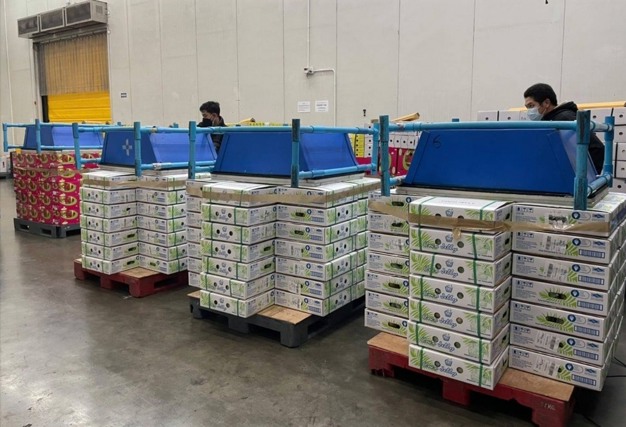
"I decided to leave a good career and dedicate myself to implementing systems within my capacity. I started my company initially called Coolcargo and now Freshport (Asia) by developing inbound fresh produce infrastructure for retailers in Thailand and Vietnam, designing and implementing highly efficient perishable handling facilities and solutions. I understood cold chain infrastructure, but where the retailers dropped off was a lack of knowledge of those upstream activities that link agriculture, post-harvest quality, cold-chain and sustainability. There was a whole gap in this area in Asia," said Chris.
"I also became involved in food loss reduction, particularly in low-cost, cold-chain transportation, becoming quite passionate about improving inbound agricultural supply chains and using my knowledge to do things that hadn't been done before, such as using thermal pallet covers in lieu of refrigerated transport. I started with the specific objective of reducing food loss inbound from agricultural areas to the retail shelf in Thailand. I started with Thai-based solutions (initially with high-value organics. Following a conference paper I presented at a Fruit Logistic event, I was encouraged by a visiting senior airline perishable manager to develop an airfreight facility capable of shipping fresh produce by air, improving handling quality and most importantly minimise the use of Polystyrene foam boxes.
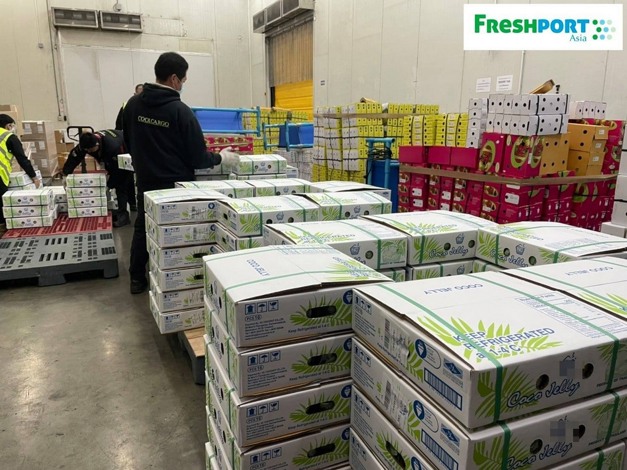
“With a small network from GTZ and Chiang Mai University, we jointly wrote and were successful in receiving a significant European Union grant to enhance Fresh produce exports from Thailand and Vietnam to Europe, which involved establishing an end-to-end value chain based on perishable air cargo. I looked at every handling element from post-harvest, processing packaging, air cargo shipments, forwarder and airline pricing and destination handling. Nearly every step was broken or had issues collectively resulting in huge losses, claims and damages of over 25% due to poor temperature control and handling. It was a huge blame game with no one in a position to own and champion intervention and develop an end-to-end solution.”
In conjunction with influential leaders from Tesco, British Airways, Cargo Terminal Operator and several leading Thai shippers, Chris developed an end-to-end air cargo solution out of Bangkok to trial incremental improvement. At this stage, the Thai baby corn industry was rapidly losing critical mass due to the burden of inefficient costs that buyers were sourcing from other countries such as India. Tesco saw this project as a food security issue and felt it was essential that it balanced its sourcing to include Thai fresh produce. Thailand was one of the leading suppliers of baby corn to Europe, but Tesco and other retail buyers were just about to abandon Thailand as a source.
With most shipments being C&F, Thai fresh produce exporters often shipped baby corn, which is highly sensitive to temperature fluctuations, paying air freight on products that arrived in the UK temperature damaged or rejected.
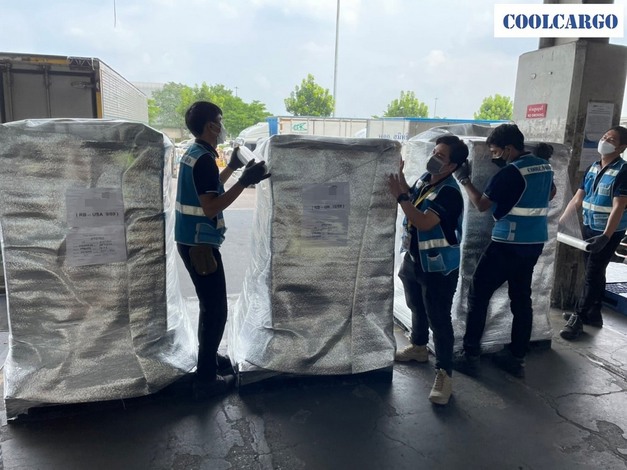
"It was a very cruel situation that they were in, and due to traditional and outdated collection and un-just forwarding arrangements, subject to cost-cutting or well-intentioned but ineffective use of polystyrene boxes all the way, the farmers were losing out.
When Chris started the project, Thailand was shipping probably 60 tonnes a day into the UK alone, and by the time the project fully started, they were down to 10 tonnes a day; they were rapidly losing the market. You can't recover a baby corn farm; once it's gone, it's gone. India was taking over the baby corn market, and they had less distance to ship by air to the UK than Thai corn had to make.
"For this project, I looked at the process from harvest right through to the retail shelf, with improvement initiatives being implemented at each step of handling, and we were able to get trial shipments going and eventually recover the corn market for Thai growers. One of the challenges we faced during the project was the requirement to ship without Polystyrene foam boxes. This had always been the traditional way of shipping by air, but it had become grossly inefficient and environmentally damaging. Farmers spent a fortune putting their products into polystyrene boxes and then paying to put them through airport cold rooms, adding gel packs to corn that needed to be sufficiently cooled. Product temperature rapidly increased during the air cargo leg, cold rooms made no difference. Using Polystyrene is the last thing you want to do with susceptible and highly perishable produce, so we advised shipper they had to get rid of the Polystyrene and substitute with alternate packaging that allows for additional cooling before it is loaded onto aircraft."
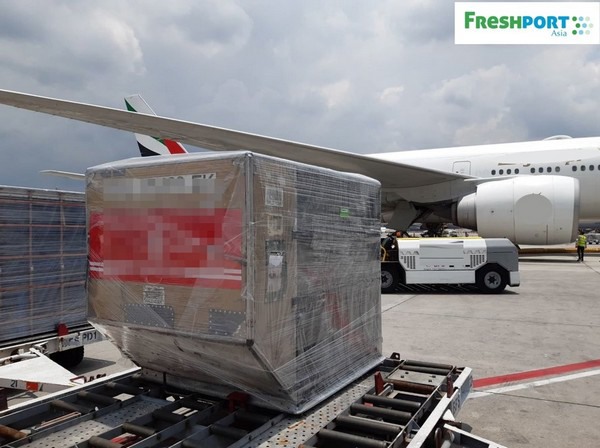
Chris then created a project to remove Polystyrene from the perishable supply chain and develop and end to end sustainable perishable handling service.
“Polystyrene is relatively inefficient for perishable air cargo as it reduces the overall density of cargo. To ship 1200 kg of baby corn in polystyrene requires three AKE shipping containers, each with only about 350 kg of net product to which gel packs are added and sometimes small quantities of dry ice. Airlines, however, charge volumetric weight, usually about ~600kg, which means a 1.7 cost ratio penalty for the product as the destination. The last issue to solve was the effect of removing Polystyrene from the AKE, which we substituted with precut and fitted reflective EPE foam inside the AKE before loading it in a cold room and sealing the opening. This replaced Polystyrene with one single insulated wrap and prevented radiant heat that would be transmitted by the skin of the AKE when in the sun.
“This increased the density of the first AKE to allow 1100-1200kgs of corn in the first AKE cargo position; the airline charged the full price; which then allowed them sell the now vacant second and third pallet positions, making more revenue for each kg shipped. The shippers make money from not paying for the pivot weight and getting better freight utilisation. Receiving cargo terminals were not paying expensive waste removal costs, (£150 for a hopper of Polystyrene to be taken away at Heathrow Airport) and the retailers are getting better product quality and improved shelf life because of better temperature control. Pallets are now thermally insulated with recyclable PE foam, which is recovered at Heathrow and which people will pay for; there are no disposal costs. Tesco then put its full support behind this new solution and helped offset investment costs by running a huge national Taste of Thailand program, sourcing a full range of Thai produce for a promotion of over six weeks. With no product loss and extended shelf life, this entrenched the solution with Tesco who then extended the range to Thai orchids. The quality coming through the process was so good, a seven-day vase life guarantee was provided for orchids shipped through the Coolcargo process during the promotion.
That process has now been going for 17 years, Chris estimates the amount of Polystyrene which they have taken out of the UK market is the equivalent of two 20-story condominiums in compressed volumes, and space saved for airlines is around 27 standard large aircraft per year so it frees up constrained cargo capacity for airlines less aircraft that can be used for other product, the whole thing has been a huge environmental success and has entrenched a sustainable and high-quality end to end handling solution.
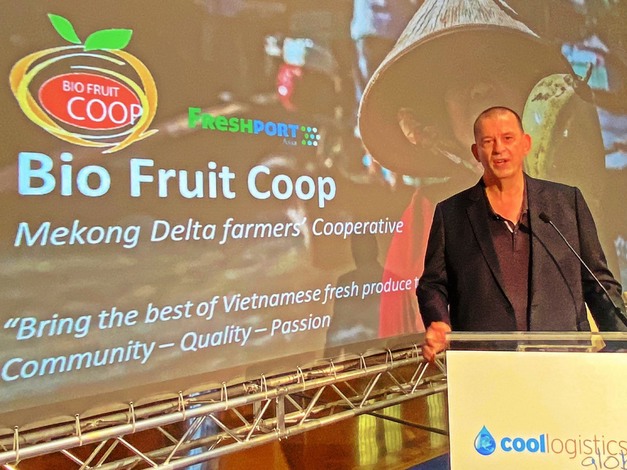
“I have a specialist team at Bangkok airport that does this value-added service daily, and we have had no process-related claims in 15 years. This solution allowed produce to be shipped through Middle Eastern airports, offering shippers lower air cargo rates than direct flights. Product in insulated AKEs can sit on the tarmac for several hours, which is enough to cover trans-shipment times. Overall, the cost model is the cargo terminal charges approximately 20 cents / kg for this service, however the savings generated across the entire perishable chain is approximately $2USD / kg including avoidance of claims, increased airline revenue, favourable freight rates and single use polystyrene waste reduction... without considering the environmental benefits and lower carbon footprint associated with food loss reduction and lower cold chain energy costs.”
For more information:
Chris Catto-Smith
Freshport Asia
Tel: +66 81 7357617
cattoc@freshport.asia
www.freshport.asia
